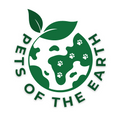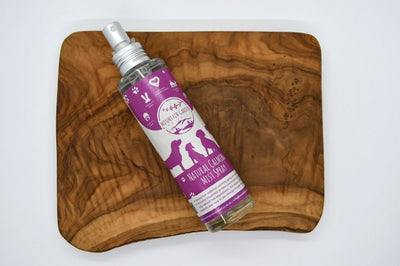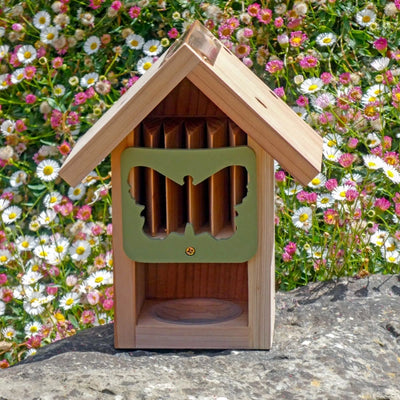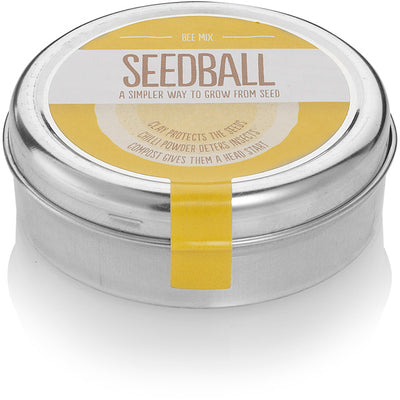TOP 10 WAYS TO REDUCE YOUR DOG'S ENVIRONMENTAL PAWPRINT
So, you’re a climate change crusader and your dog’s a die-hard puptivist, the two of you campaigning to save the planet together! But what if your pup’s pawprint is part of the problem? Years ago, Stephen Fry showed QI contestants a photo of a family with two children, a car and a dog. He asked, “What could this family do to reduce their carbon footprint?” Their reply? “Get rid of the car.” Wrong! The correct answer was ‘Get rid of the dog’. When we consider that the majority of our beloved furry family members are fed two meaty meals a day, plus meat-based treats, it’s no surprise that their diet is contributing to more carbon emissions than either the car or the kid’s meals.
Unfortunately sharing our homes with a dog, especially a meat-eating mutt, has a significant environmental impact. Two years ago, research from the University of Edinburgh found that the pet food industry produces almost 3% of the total carbon dioxide (CO2) emissions from farming. That’s the same amount of CO2 produced by a sixth of global flights! Obviously though, ‘getting rid of the dog’ isn’t a solution any pawrent would get on board with. And we don’t have to! We’ve picked out 10 simple ways that we can all reduce the environmental pawprint of our pooches.
1. Cut back on meat in your pup’s main meals.
Back in 2017, research revealed that roughly a quarter of calories from all animal meat consumed in America are now eaten by pets, and the picture is likely to be similar here in the UK. But if both you and your 70-pound retriever switched to a plant-based diet you could save together, every day, 2,200 gallons of water, about 60 square feet of rainforest and 90 pounds of grain. Of course, you don’t need to go fully ‘vegan’: introducing a flexidogian diet will have a big impact. Mix half of your dog’s regular meat-based kibble with a half serving of THE PACK, or switch in a plant-based dinner a couple of days a week. Which brings us to…
2. Do Meat Free Muttday with your hound!
Launched by the McCartneys in 2009, Meat Free Monday encourages people to help slow climate change, conserve natural resources and improve their health by having at least one plant-based day each week. The official website has a calculator where you can work out just how much positive impact you’re having with your meat-free days. Why not include your pup as a participant too, and watch that pawsitive impact soar?
3. Reimagine treat time.
Swap meaty bones and pig ear chews for fresh veg, healthy plant-based treats and meat-free dental chews. Why not freeze dollops of THE PACK in ice cube trays and use those as treats on warm days? Or spread some delicious No-Moo Ragu onto a lick mat. When your dog associates treat time with delicious plant-based food like butternut squash cubes, raw carrots or THE PACK, he or she will get a taste for living life on the veg!
4. Choose sustainable pet food packaging.
Take care to choose environmentally conscious brands who use packaging that won’t give our planet indigestion. THE PACK uses 100% recyclable packaging, even down to the anti-tamper tape! Our sturdy packaging stop the cans getting damaged, preventing food waste. Remember that food waste is a bigger contributor to carbon emissions than excess packaging (luckily, dogs tend to lick up every last morsel of THE PACK!). Metal cans are also a true example of a circular material: chances are that your can will live on as a bus, plane, or simply a humble can, again and again.
5. Think twice about raw feeding.
The BARF or raw meat diet has become a big trend in the dog food world, with dire consequences for our planet. Demand for this ‘human-grade’ raw dog food boosts meat consumption and thus increases our dogs’ environmental pawprint. When we feed raw meat, cows, pigs, chickens and other ‘food animals’ are being bred and killed specifically for dogs to eat, rather than our pups using up our leftovers. Raw feeding also has public health risks, potentially contributing to antibiotic resistance – another huge threat to life on earth.
6. Take your pup on local walks.
Rather than hopping in the car for every walkies, use your daily stroll as an opportunity to find new hikes closer to home. Remember, what might seem a dull walk to you might be a smell-stravagnaza for your hound! That boring pavement? Covered with peemails. That empty playing field? Your dog can track mice, rabbits, foxes… Let your pup take you on a sniffari and you might find some hidden local gems!
7. Pick up your dog poop - in biodegradable bags!
It’s estimated that pet dogs in the UK produce over 4.4 billion pounds of waste per year, so it’s safe to say we pawrents are used to picking up poop! Unfortunately, not all of us remember to take home our doggy dos, The National Animal Welfare Trust picking up roughly 77,000 abandoned bags of poop every year. Some pawrents even leave their mutt’s mess to ‘decompose’, forgoing bags altogether. This is a Great Dane-sized no-no! When we leave dog poo out in the wild, it becomes a breeding ground for parasites, as well as the natural acids destroying the vegetation around it. Rogue dog poop can wash into and contaminate waterways and stimulate the growth of algae. Of course, while picking up after your pooch is a must, not all poo bags are born equal. Nothing stinks worse than plastic waste, and a regular dog poo bag can take up to 1000 years to breakdown! These harmless looking bags can also be gobbled up by wildlife and build up within the food chain, having devastating effects. Instead, choose bags that are genuinely biodegradable and home compostable certified. These can often break down in as little as 3-6 months.
8. Careful of chemical medications.
Many flea and tick treatments are designed to be administered to dogs on the skin (topically), often monthly. In 2020, a study found that these highly toxic insecticides, like Fipronil and Imidacloprid, two of the most commonly used flea products, were poisoning rivers across England. When these treatments rub off on walkies, they’re lethal for ecosystems. One flea treatment of a medium-sized dog with topical treatment Imidacloprid contains enough pesticide to kill 60 million bees! Both Fipronil and Imidacloprid have been banned on farms since 2018 but are still used on pets. You can opt out by choosing a different oral treatment that doesn’t wash off, or make sure you wait at least 48 hours after applying the product before taking your dog for a swim or walk in nature.
9. Look for eco-friendly toys and accessories.
If you’re anything like the pawrents at THE PACK, it’s hard not to come home from the supermarket with a new dog toy every trip! Unfortunately, the majority of squeaky balls and cute soft toys are made with plastics and synthetic fibres, which are no fun for the planet. Instead, look for tugging ropes made of cotton and plush toys that don’t contain polyester or other synthetics. Choose machine washable, durable products, like natural rubber, so they last as long as your dog has energy to play (and if they’re eating our meals, that’ll be many, many years!) Also consider the fabrics used in your dog’s leash, collar and winter jacket. Avoid animal products like leather, as these will send your pooch’s pawprint spiralling!
10. Seek out an environmentally conscious vet.
Eco-credentials might not be the first thing you think of when choosing a veterinarian for your dog, but it might be one of the most impactful things you can do. Look for vets who source electricity from renewables and use environmentally friendly cleaning products. Whose scrubs are made from recycled plastic or organic cotton. Whose suppliers offset their carbon emissions and whose web hosting uses green technologies. Eco Vets in Wandsworth is a great example of a new practice doing all of these things, and the organisation Vet Sustain is supporting other veterinary practices to reduce the environmental impact of their operations. A revolution in veterinary care is coming, and you and your pup can be part of it! After all, vets who care about the planet tend to be some of the most compassionate, and that’s everything when choosing who we trust to care for our fur children.
Just doing two or three of these things will have you and your dog bounding towards a more sustainable future: a world where there are plenty of trees for your pup to pee on. If every pawrent of the UK’s 12.5 million dogs made one change, whether switching poo bag brand or veterinarian, the impact would be huge – and necessary. Because even the goodest puptivist can’t fetch us another planet!
Blog Written By Alice Oven
Shop The Pack Plant-Based Dog Food












